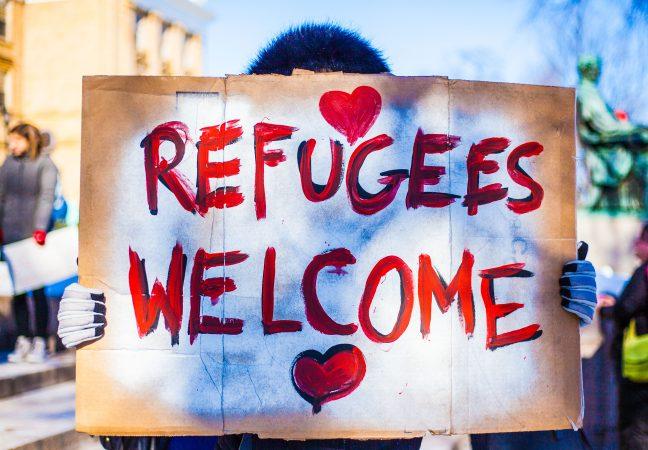Following the collapse of the Afghan government to Taliban forces, the United States has led the global humanitarian effort to evacuate tens of thousands of Afghan refugees.
Many of these people worked for the U.S. government during its 20-year-long war in Afghanistan and are desperately fleeing to avoid persecution from Taliban forces for working with the Western-backed government.
Today, around 8,700 Afghan refugees are being housed at Fort McCoy, near Tomah, Wisconsin, making it the largest temporary Afghan refugee camp in the United States. Refugees and their families will remain at the base until they can complete their special immigrant visa applications and be resettled elsewhere.
This makes the question of whether the state has a place in housing and helping Afghan refugees a crucial one for Wisconsinites — a calamity which the state must respond to with aid and support.
Despite the successes of rescuing thousands of refugees, some Wisconsin politicians have already voiced their concerns about the thoroughness of the vetting process.
Rep. Tom Tiffany, R-Wis., visited Fort McCoy and was surprised to find that before refugees receive their visas, they are allowed two years of “parole” — a type of legal authority commonly invoked during emergencies — to live in the United States. U.S. Sen. Ron Johnson, R-Wis., also discouraged quickly resettling migrants to avoid rushing the vetting process.
Both figures are concerned about the safety of bringing unvetted refugees into communities around the country who could potentially have terrorist affiliations.
The Biden administration has reaffirmed all refugees are vetted twice before arriving in the United States, but many still distrust the administration’s chaotic mismanagement of the Afghanistan crisis. The comment sections of news articles surrounding refugee resettlement are full of skeptics advocating for barring new refugees from settling in the U.S.
While many refugees will settle in other parts of the U.S., some will also surely stay in Wisconsin for many years. Jewish Social Services, a refugee resettlement agency based in Madison, Wisconsin, will be assisting refugees and their families to find jobs and housing in the Madison area.
The group is one of many leaping into action across the state, and more groups like them are needed to help assuage the current and long-term challenges that come with processing copious refugees.
With Wisconsin tuition freeze set in stone, out-of-state students likely to pay the price again
Despite these challenges, Wisconsin and other states have a moral obligation to accept and assist refugees. Given the years of war the United States waged in Afghanistan, we cannot abandon all responsibility for the mess we created.
The U.S. hired many Afghan people with the promise that they would live under a more free, American-backed government in Afghanistan by the time they left. In doing so, Afghans put themselves and their families at risk of attack from the Taliban and other terrorist groups hostile to the United States. Now that the United States is leaving Afghanistan, we must protect our allies who assisted our war efforts there and who are now in danger.
While more Americans agree we must help interpreters and other military related personnel, we must not limit our support to them. Female students and advocates, employees from Western businesses and media members are all groups the Taliban is hostile toward because of their affiliation with pro-Western governments.
The U.S. built the conditions in which these people could flourish. If Americans truly do believe in democratic ideals, such as women’s rights, capitalist economies and free press, we cannot abandon the people we convinced to believe in the promise of democracy.
What message would this send to others living under oppressive regimes around the world about the consequences of supporting democratic ideals? How can we expect our allies to trust us if we abandon them when they need our help most?
These are questions the American public must come to grips with as we cannot absolve our responsibility from the crisis in Afghanistan. Part of that responsibility must be assisting all of our allies there, including all supporters of democracy.
In 1975, the United States began another major resettlement effort after the fall of Saigon to North Vietnamese communist forces. President Ford immediately airlifted 175,000 Vietnamese refugees to the United States and another half million would also migrate over the next twenty years. This was an essential part of American foreign policy when exiting Vietnam and it should remain so today.
Politicized 2021-23 Wisconsin state budget provides tax breaks for the wealthy
Since the war, Wisconsin has remained one of the largest refuges for Hmong people who fled Vietnam. In 2000, there were over 30,000 Hmong people living in Wisconsin. Cities like Milwaukee, Wausau and Sheboygan have some of the largest Hmong populations in the country.
Yet, little has changed in Wisconsin because of Hmong settlement and there has been no threat to any Wisconsinites’ safety because of their settlement here. It is a clear case study for how refugees bring new life and joy to communities — not danger.
Today, Wisconsin should look to the successes of the past, like resettling Hmong refugees, to relieve anxieties about settling another refugee population. Like then, now both the United States and Wisconsin must do their part to help this struggling population flee the war we started.














